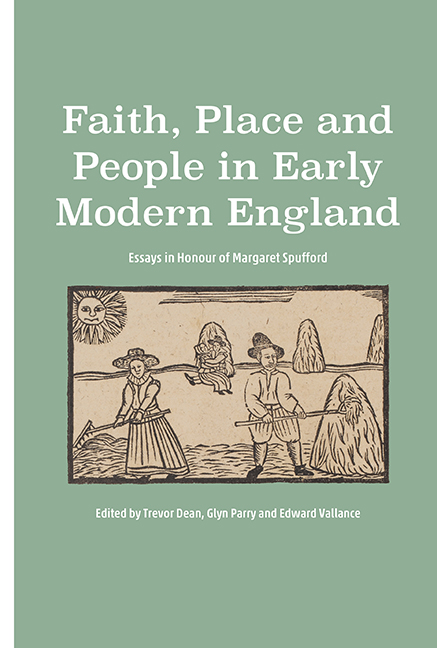Book contents
- Frontmatter
- Dedication
- Contents
- List of Illustrations
- List of Contributors
- Record Office Abbreviations
- Acknowledgements
- Introduction
- Margaret
- Part I Faith
- Part II Place
- 4 The Heralds and the Hearth Tax
- 5 The Hearth Tax and the Poor in Post-Restoration Woking
- 6 Reassessing the English ‘Financial Revolution’: Credit Transferability in Probate Records of Sedbergh and Maidstone, 1610–1790
- Part III People
- Bibliography of Margaret Spufford's works
- Index
- Tabula in Memoriam
5 - The Hearth Tax and the Poor in Post-Restoration Woking
from Part II - Place
Published online by Cambridge University Press: 19 July 2019
- Frontmatter
- Dedication
- Contents
- List of Illustrations
- List of Contributors
- Record Office Abbreviations
- Acknowledgements
- Introduction
- Margaret
- Part I Faith
- Part II Place
- 4 The Heralds and the Hearth Tax
- 5 The Hearth Tax and the Poor in Post-Restoration Woking
- 6 Reassessing the English ‘Financial Revolution’: Credit Transferability in Probate Records of Sedbergh and Maidstone, 1610–1790
- Part III People
- Bibliography of Margaret Spufford's works
- Index
- Tabula in Memoriam
Summary
Until one has more adequately translated the statistics into human terms, it seems that despite all the care one takes, the human beings have slipped between the meshes of the net, and that one has not yet begun to understand the real situation, which must have been so immediately apparent to the most illiterate peasant in every one of the alehouses of the villages concerned.
Finding those who, in these words of Margaret Spufford, might slip ‘between the meshes of the net’ is a task well suited to a micro-study where hearth tax listings of householders, supported by a fortuitous survival of good local records relating to the administration of poor relief and parish rates, permit glimpses of otherwise elusive individuals. By tracing these individuals we can reach a better understanding of the administration and implementation of both hearth tax and poor law. However, Spufford was writing about more than this. Throughout her working life she sought to understand better the human condition, to know how individuals, their families and communities lived, harvested, traded, prayed, celebrated and suffered. For most of the people of Woking, like the majority of their countrymen of that time, the parish was the stage upon which they acted out their lives against the backdrop of the political, social, economic and religious issues of the day, and it is primarily through the medium of the parish documents that we can see traces of that ‘real situation’ which Spufford strived to find and describe in her own work.
Woking parish documents coinciding with the hearth tax period 1662–89 include lists of those paying rates to repair the church and relieve the poor, and also those who received relief, either regular pensioners or those given intermittent payments. They not only reveal a sophisticated operation of poor relief management, but cast light on the vexed question of what proportion of householders the hearth tax might have included, or omitted, from its Woking lists. This carries significance for local and wider demographic studies. Historians estimating the size of adult population in the later seventeenth century often use a set multiplier of the hearth tax to assist them.
- Type
- Chapter
- Information
- Faith, Place and People in Early Modern EnglandEssays in Honour of Margaret Spufford, pp. 111 - 131Publisher: Boydell & BrewerPrint publication year: 2018

